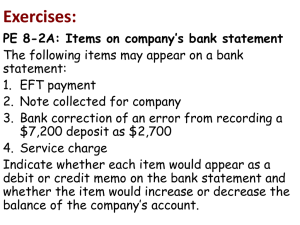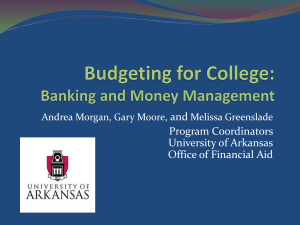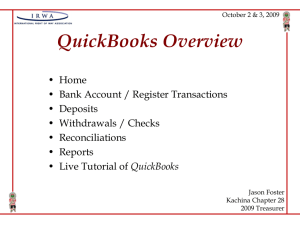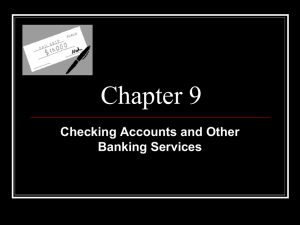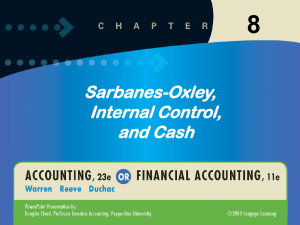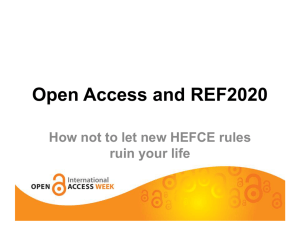Cash Handling Procedures - Treasurer`s Office
advertisement
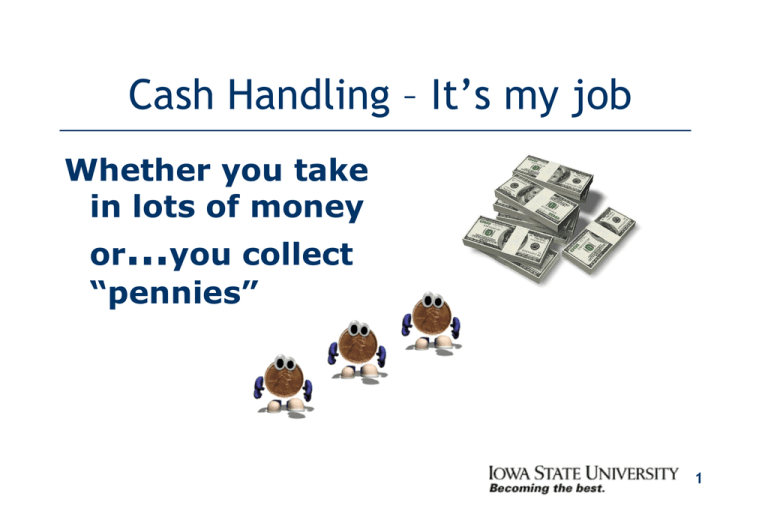
Cash Handling – It’s my job Whether you take in lots of money or…you collect “pennies” 1 ……..the principles of good cash handling are basically the same. •Segregation of Duties •Security •Reconciliation •Management Review •Documentation 2 What is included in “Cash Handling” ? •Coins •Currency •Checks •Money Orders •Credit Cards •Cash Equivalents Tokens Tickets Stamps Gift Cards 3 First, let’s talk about risk and controls…. Who or what is at risk? 4 Risk? •Cash is stolen •Cash is lost •Lost revenues •No audit trail •Finger pointing/Accusations •Lost job! 5 Risk and Controls Remember – In the cash collecting process, YOU are just as important as the cash……….. The controls (rules) that we will discuss are designed to protect both YOU and the cash you are handling. 6 Before cash collection begins….. “The planning checklist” • • • • • • • • Is a change fund needed? How is cash received? Mail or in person? Who is going to collect the cash? Record the cash? How is the cash going to be secured? Who is going to prepare the deposit? How? Deposit at the Bank or Treasurer’s Office? When? Reconciliation? Management Review? Who needs training? 7 Making Change • Is a change fund needed? • If so, then you need to: – Send a written request for change fund to Accounting – Keep amount at a bare minimum – Keep the cash safe Never make change from your personal cash! 8 Collecting the Cash • How is cash received? • Who is going to collect the cash? • Who will record the cash? 9 Collecting the Cash In Person • The cash received must be entered on a cash register, if one is available, and a copy of the receipt given to the customer. • If a cash register is not available, then create a dual copy receipt, keep one for balancing, and give one to the customer. 10 Collecting the Cash In Person • The cash collection point must maintain a clear separation of duties. An individual should not have responsibility for more than one of the cash handling components: – Collecting/Depositing – Reconciling 11 Collecting the Cash In Person • Immediately endorse all checks with a restrictive endorsement payable to “Iowa State University” and the corresponding departmental fund/account number. For Deposit Only Iowa State University 201 00 00 12 Collecting the Cash by Mail • Designated staff should open the mail and immediately restrictively endorse each check with ”For deposit only to Iowa State University”. • Log into the Kuali Financial System (KFS) and enter the details of each check • Alternatively, departments may enter the detail in their own database system and enter only summary information into the KFS. For Deposit Only Iowa State University 201 00 00 13 Collecting the Cash by Mail • Checks received that were intended for another department should be restrictively endorsed to “Iowa State University” and forwarded to that department for deposit. • If the intention is unclear, the check should be restrictively endorsed to “Iowa State University” and sent to the Treasurer’s Office to handle. For Deposit Only Iowa State University 14 “Now that we have collected the cash, what do we do with it? • Secure • Balance • Deposit • Reconcile 15 How is cash going to be secured? • Cash must be stored in a safe or other secure place until it is deposited. • Whether your department uses a safe or a locked cash box, it is very important to change the combination when someone who knew the combination leaves the department. 16 How is cash going to be secured? WHILE in Use… • If making change is necessary, each person collecting cash should have a cash box or drawer that no one else uses. When not in Use… • Secure the cash box in a locked drawer and limit access. • Secure the cash drawer by locking it and limiting access. When Collecting… • When collecting payments in a high traffic area, you may want to consider installing an alarm system. (Contact Department of Public Safety for guidance) 17 Balancing Balancing Every day, all cash receipts must be balanced. • Compare the cash (currency, coin, checks, credit card receipts, etc.) to the records (cash register tapes, receipt copies, sales logs, etc.) • Identify and resolve any discrepancies. • Sign and date to provide evidence of balancing. 18 How to prepare the deposit. • All cash sales must be recorded through the use of the Kuali Financial System (KFS) in Access Plus (https://accessplus.iastate.edu/ frontdoor/login.jsp). • An adding machine tape of the individual checks with the total of all the checks must be included with the deposit. • The currency must be sorted by denomination bundled into groups of $100. 19 How to prepare the deposit. • Once the deposit has been submitted in the Kuali Financial System, a document number is assigned. • This document number, along with the cash and checks, must be delivered to the Treasurer’s Office (1220 Beardshear). • For those departments that are not conveniently located to the Treasurer’s Office, checks may be sent by campus mail. • All currency and coin must be hand delivered to the Treasurer’s Office (1220 Beardshear). 20 How to prepare the deposit. • When cash receipts are less than $100, the deposit must be delivered within 5 days. • Monies exceeding $100 should be delivered within 2 days. • Employees are held personally liable under their bonds for all monies handled. • The responsibility for monies does not cease until the monies are deposited with a completed and correct Kuali Financial System (KFS) transaction and verified by the Treasurer’s Office. 21 Reconciliation • Verify that all transactions are complete, recorded, and deposited on a timely basis. • This function must be performed by an employee who has no cash handling responsibilities. • Reconciler investigates and resolves discrepancies, and initials (or signs) and dates documentation reconciled. 22 Reconciliation • Monthly, compare the deposits submitted per Kuali Financial with your Departmental Statement. • Evidence of reconciliation must be maintained by the department. 23 Management Responsibilities • Establish an effective internal control system. • Delegate responsibility for cash handling, while maintaining proper segregation of duties. • Require that staff who handle cash be properly trained and that they follow all of the University’s cash handling policies and procedures. • Review reconciliation on a regular basis, then sign & date documentation review. • No matter who is collecting, depositing, and reconciling cash, Management is ultimately accountable. 24 Segregation of Duties • This is the most important control in the cash collection process, and often, the most difficult to manage. A different person should be involved in each step: recording of charges/billing, cash receipting, cash depositing, and reconciliation. • If the segregation of duties is a problem for your department, please contact Internal Audit for guidance. 25 Record Retention • Keep the following documents for five years: – – – – Cash Register “total” tapes Departmental Copy of receipt Electronic Sales Log Cash over/short record • Credit Card receipts must be kept 18 months. 26 Transporting Cash • If you have responsibility for taking the cash deposit to the Treasurer’s Office, please: – Put deposit in a cash bag or envelope – Do not be conspicuous – Do not take the same route or go at exactly the same time every day 27 Cash Equivalents If you have the responsibility for cash equivalents such as parking passes or gift cards, remember that they must be treated as if they are cash: – – – – – – Secure in a locked safe or drawer. Record the sale. Balance sale. Deposit cash promptly. Reconcile sales against statement of accounts. Resolve all outstanding issues. 28 Cash Handling Policy Please take the time to read and review the University’s Cash Handling Policy online at: http://www.treasurer.iastate.edu/policies/cashhandling.html 29




